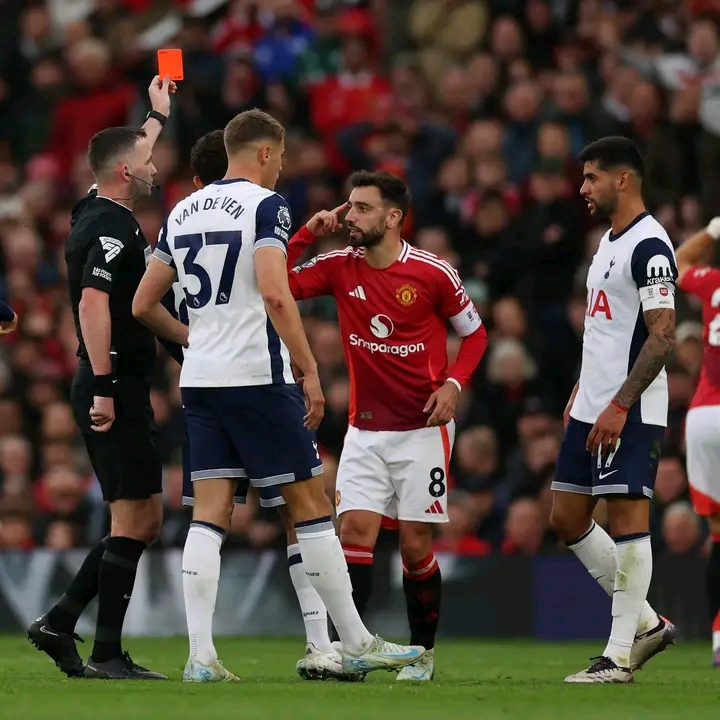Manchester United fans expressed their growing frustration after yet another disappointing individual performance in their Premier League showdown with Tottenham Hotspur. While the match itself was already proving to be a difficult one for the Red Devils, one player, in particular, found himself in the crosshairs of supporters’ criticism.
Tottenham stunned the Old Trafford crowd early in the game, with Brennan Johnson finding the back of the net just three minutes in. His goal set the tone for a first half where United struggled to find any rhythm or composure, trailing 1-0 at halftime. Spurs had come to Manchester prepared to capitalize on any mistakes, and it seemed like United was all too willing to offer them up. Despite trying to mount a response, Erik ten Hag’s side appeared disjointed, lacking the sharpness and cohesion needed to break down their opponents. The situation turned even bleaker right before the interval when Bruno Fernandes received a straight red card for a reckless foul on Tottenham’s playmaker, James Maddison. United was left not only trailing but also down to ten men, with a monumental task ahead in the second half.
Yet, amid the team’s struggles, much of the ire from fans was directed at one player—Joshua Zirkzee. The young forward, who has been given more opportunities to shine, found himself under immense pressure to deliver, especially in the absence of other attacking options. However, his performance during the first half left much to be desired. Zirkzee had the chance to draw United level but squandered the team’s best opportunity when he failed to convert a clear one-on-one chance. This miss seemed to symbolize United’s broader struggles, and it quickly ignited a wave of anger on social media.
Fans were not shy in voicing their displeasure, with one supporter taking to X (formerly Twitter) to express their bewilderment, writing: “This might be the worst 30 minutes of football I’ve seen. Did Zirkzee win a contest to play for us?” The sentiment was shared widely, as frustration mounted over what many felt was a missed opportunity to change the course of the game. Zirkzee’s inability to capitalize on the chance left fans wondering if he was up to the task of leading the line for a club of United’s stature.
Another fan offered a more detailed critique, focusing on Zirkzee’s lack of pace and sharpness in key moments. “Zirkzee is too slow,” they remarked. “He ruined our counter-attacks and couldn’t finish a one-on-one. Not a natural finisher.” These words echoed a common concern among United fans, who have long been craving a striker with the killer instinct to finish off chances in high-pressure situations. In a game where every chance counts, Zirkzee’s sluggishness seemed to weigh heavily on the team’s ability to strike back.
The criticism didn’t stop there. Fans began drawing comparisons between Zirkzee and some of the Premier League’s top strikers, with one supporter pointing out his physical similarities to Erling Haaland, only to highlight the stark difference in their effectiveness. “Zirkzee is 1.93m tall, just shy of Haaland’s 1.94m, yet he’s always reaching for the ball,” they commented. “It’s like he’s never in control of his shots—really odd.” For fans, this comparison wasn’t just about height; it was about how a player uses their physical presence to dominate defenders and finish off opportunities. Unfortunately for Zirkzee, his performance left many feeling that he wasn’t living up to his potential, especially when placed side by side with a player as clinical as Haaland.
As the first half drew to a close, the criticisms became even more pointed. Another fan summed up what many were thinking: “Zirkzee is constantly stretching for the ball—no instinct in the box whatsoever.” This observation touched on a deeper issue—Zirkzee’s perceived lack of anticipation and positioning in the penalty area. In a team like Manchester United, where forwards are expected to be sharp, reactive, and decisive, Zirkzee’s struggles stood out even more glaringly. His tendency to reach for passes rather than position himself proactively frustrated fans who were desperate for a player who could bring an instinctual, predatory presence in the opposition’s box.
The overarching sentiment from the United fanbase was clear—patience with Zirkzee was running thin. In a game where the team needed a hero, the young forward’s underwhelming display only added to the sense of disappointment surrounding the match. Fans weren’t just upset about the scoreline; they were frustrated by what they saw as a deeper issue with United’s ability to deliver under pressure, particularly in the final third.
As the second half approached, United had a mountain to climb, but for many fans, the damage was already done. Their frustrations with Zirkzee were emblematic of larger concerns about the team’s attacking options, and whether or not those currently trusted with the task were capable of stepping up when it
mattered most.
